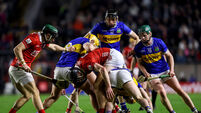Zimbabwe's opposition rejects power sharing
Zimbabwe’s main opposition leader drew new political battle lines today in a showdown to oust embattled President Robert Mugabe, announcing he would not be part of any power-sharing government with the ruling party.
Morgan Tsvangirai, hardening the stand of the opposition Movement for Democratic Change, said if Mugabe was to leave office, the ruling party should be left to run the country for 90 days before new presidential elections were held.














